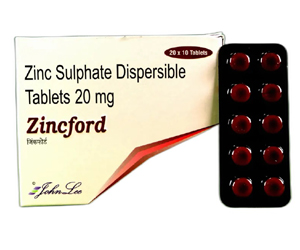◉Swallow the tablets/capsule whole, do not crush or chew
Follow your doctor’s instructions for adjusting your dose.
How does the Drug work
◉Zinc is an essential trace mineral that plays a crucial role in various physiological processes in the human body. It is required for the proper functioning of over 300 enzymes and is involved in many biochemical reactions. Here’s how zinc works and its roles in the body:Enzyme Function: One of the primary functions of zinc is its role as a cofactor for numerous enzymes. Cofactors are molecules that assist enzymes in carrying out their specific biochemical reactions. Zinc helps activate these enzymes, allowing them to perform their designated tasks effectively.
◉ Immune System Support: Zinc is known for its immune-enhancing properties. It aids in the development and functioning of immune cells, including white blood cells, which play a vital role in fighting off infections and illnesses.
◉ Protein Synthesis: Zinc is essential for protein synthesis, the process by which the body produces new proteins. This is crucial for growth, repair, and maintenance of tissues throughout the body.
◉ DNA Synthesis and Repair: Zinc is involved in DNA synthesis and repair, which is necessary for the proper functioning and reproduction of cells. It is especially important for rapidly dividing cells, such as those in the immune system and gastrointestinal lining.
◉ Antioxidant Defense: Zinc is a component of several antioxidant enzymes that help neutralize harmful free radicals in the body. Free radicals can cause oxidative stress, which may lead to cell damage and contribute to various health issues.
◉ Taste and Smell: Zinc is involved in the proper functioning of taste and smell receptors. A deficiency in zinc can lead to reduced taste and smell perception.
◉ Hormone Regulation: Zinc plays a role in the regulation of various hormones in the body, including insulin, thyroid hormones, and sex hormones.
◉ Wound Healing: Zinc is essential for the healing of wounds and injuries. It promotes cell proliferation and tissue repair, helping wounds close more effectively.
◉ Zinc is obtained through the diet and is present in various foods such as meat, seafood, nuts, seeds, and whole grains. It is available in supplement form as well, including zinc supplements like zinc gluconate, zinc sulfate, or zinc acetate, typically in various dosages, such as 20 mg.
◉ It’s important to note that while zinc is essential for good health, excessive intake of zinc supplements can lead to toxicity and adverse effects. The recommended daily intake of zinc for adults is generally around 8-11 mg, depending on factors such as age, sex, and life stage. Always consult with a healthcare professional before starting any supplementation to ensure it’s appropriate for your specific needs and health status.
